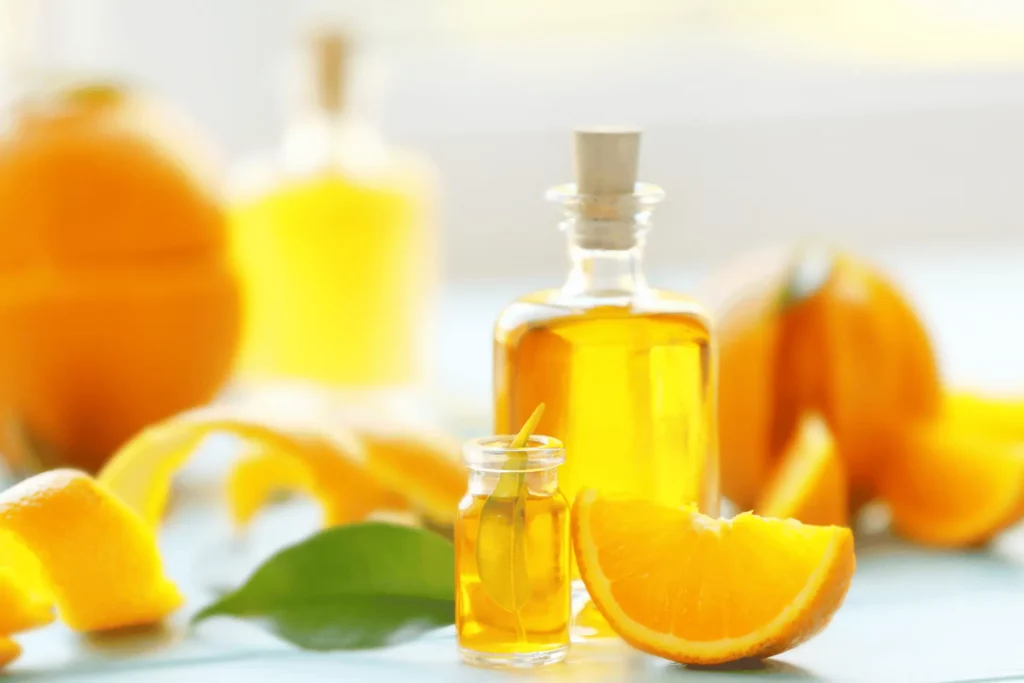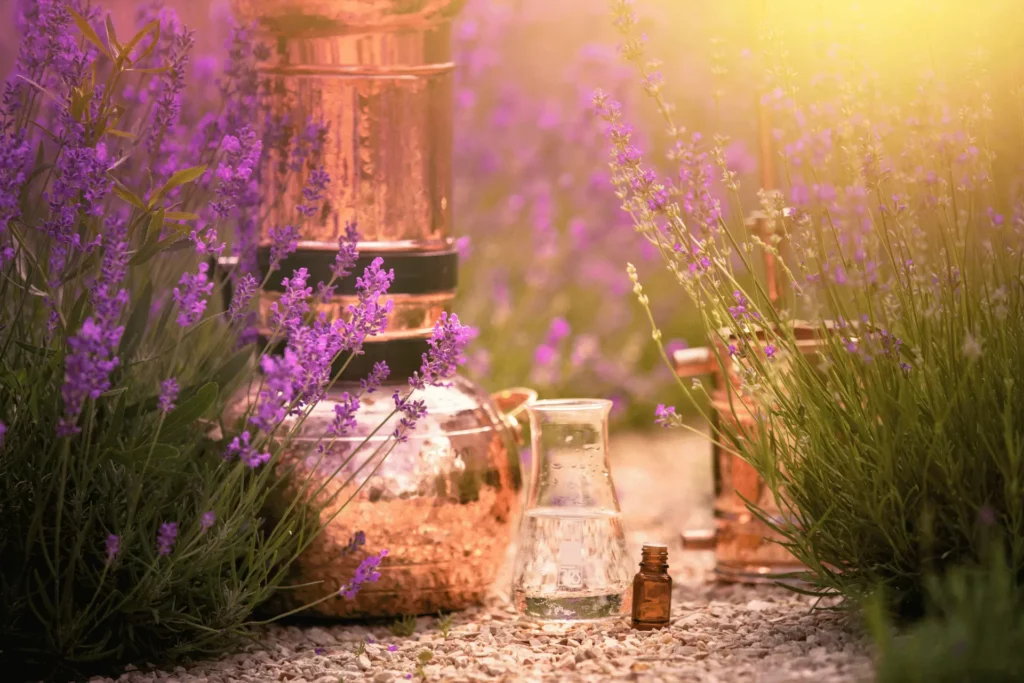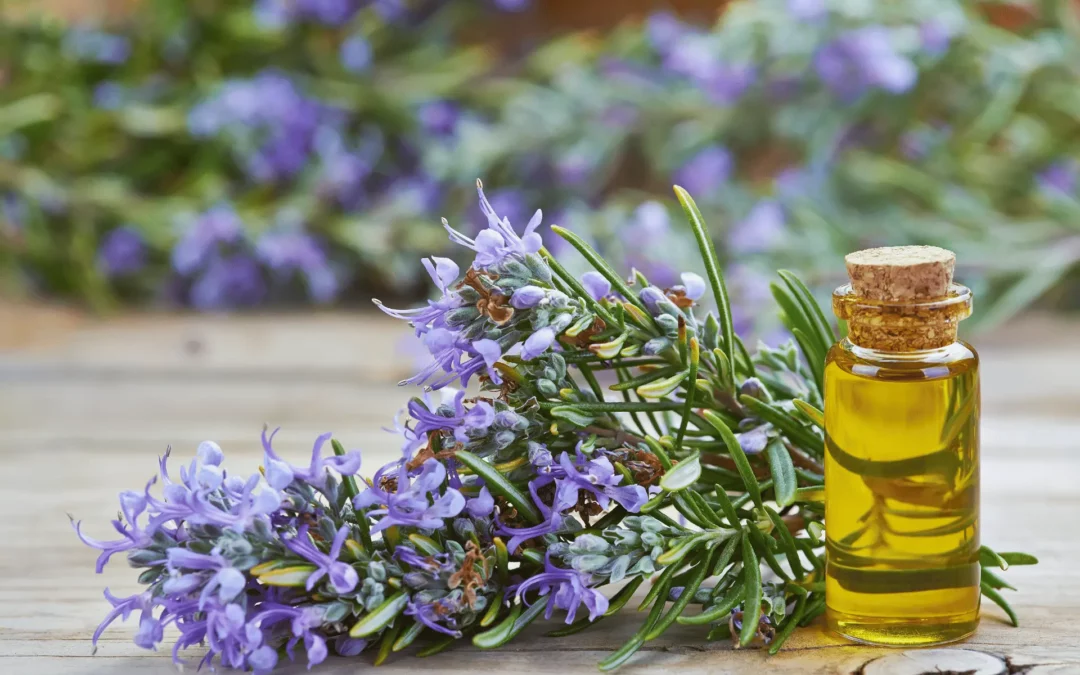Contents
Not only do they smell good, they are also very effective! Essential oils – little wonders of nature that support us. Whether it’s to help us regain our balance, find inner peace, get a boost of freshness during a midday slump or to keep our feet on the ground during migraine attacks or panic. The miracle of essential oils.
I myself delved deeper into the world of essential oils a few years ago – and was thrilled! I still use them myself today and have also used them in yoga and therapy sessions. My clients were always enthusiastic – the energetic effect alone is enormous!
Essential oils have been a part of human culture and medicine for thousands of years. Even in the advanced civilisations of Mesopotamia, among the ancient Egyptians, Persians, Greeks and Romans, and later in medieval Europe, essential oils were used to purify the air, for preservation (papyrus scrolls and mummies), as offerings to the gods, as ointments and pastes for illnesses and for beauty care.
In ancient Babylon, the mortar used to build temples was even embalmed with the pure natural oil of myrrh, cedar wood or cypress.
IPure natural essential oils found their way into medicine by chance: the French chemist René-Maurice Gattefossé was injured in the explosion during an experiment in his laboratory.
The external application of small quantities of essences rapidly stops the spread of gangrenous sores. In my personal experience, after a laboratory explosion covered me with burning substances which I extinguished by rolling on a grassy lawn, both my hands were covered with a rapidly developing gas gangrene. Just one rinse with lavender essence stopped “the gasification of the tissue”. This treatment was followed by profuse sweating, and healing began the next day (July 1910).
René-Maurice Gattefossé, Chemist
He realised that he had neither scars nor prolonged pain and that the injuries healed very well. He then continued his research in this field: aromatherapy in medicine was born.

What exactly are essential oils?
Have you ever strolled through a garden of blossoming bitter oranges? Especially in the evening, the blossoms exude a beguiling fragrance: neroli.
Plants produce fragrances and flavourings. They communicate with each other in this way and can even “heal” themselves with them. Sometimes the same plant even produces different essential oils in different parts of the plant (leaves/flower/root). One example of this is the bitter orange tree. Three different essential oils are extracted from it: Neroli oil from the flowers, petitgrain oil from the leaves and wild orange is obtained from the fruit peel by cold pressing.
The fragrance… corresponds to the soul of the plant. Its essence.
Christine Rudolph
- Protection against infestation by microorganisms (viruses/bacteria/fungi)
- Protection against insect infestation
- Protection against UV radiation and water evaporation
- Attractant
- Medium for communication
The scent goes straight to our brain
Fragrance goes straight to our brain. And it goes to where our feelings are located and where our oldest part of the brain is located: our emotional memory. It reacts exclusively to odour.
And smell influences our hormones. Every thought and every feeling controls our hormones. The emotional memory is where our emotions are ingrained.
Emotion = Energy in Motion
In our “Emotional Control Centre”, smell is the only sense of all the senses (smell, hearing, sight, touch, taste) that is DIRECTLY linked to our brain and limbic system. Emotions are processed in the limbic system, our intellect comes from there and instinctual behaviour is controlled from there.
The fact is – and this is a crucial piece of the puzzle in our entire life:
Without feelings: no memories.
Christine Rudolph
This means: If we have no feeling for something, for ourselves, for others, for nature, for a certain situation… we can no longer remember it!
At that moment, we act without feeling, i.e. purely functionally. This also explains, for example, the lack of memory in someone who acts completely on autopilot out of necessity. Or the famous multitasking (which humans are not made for!): we usually can’t remember whether we switched off the light or the hob while we were on the phone.
Pure vital energy
Power without end! After all, they are the concentrated essence of the plant.
For this reason, it is also important to be careful with pure oils in general. 2 drops of peppermint oil, for example, can lift you out of your shoes and a small pinch of thyme oil is all you need to spice up the tomato sauce with your spaghetti.
But essential oils have much more to offer!
One of the most impressive and efficient features is their ability to cross the blood/brain barrier and their lipid solubility (passing through cell walls) due to their subtle nature: 1 drop of oil = trillions of molecules.
Why is this so important? The blood/brain barrier prevents pathogens from travelling from our blood into the brain. It is a natural barrier between the blood and the brain. It is permeable to nutrients and vitamins. And unfortunately also for the smallest particles such as alcohol or drugs (e.g. ecstasy or cocaine) – which is why they are so “effective” in our brain. Certain drugs used to treat Alzheimer’s disease, for example, do not get through the barrier.
This is where essential oils come in: their molecules pass through. And so research is being carried out into the extent to which pure frankincense essential oil, for example, can provide efficient support for tumour patients or people with dementia like Alzheimers disease.
Essential oils are the plants’ medium for communication, they are volatile oils, which means they leave no greasy stains, they have an antioxidant effect, they enter our cells and kill viruses, for example. Frankincense is also a natural cortisone.
The effect of essential oils is immense – and just to illustrate the power of oils: 1 gram of clove oil has the same effect as, for example, 51kg of carrots or 13 litres of beetroot or 14 kg of oranges in terms of “intercepting harmful substances” = antioxidant – in the body. I had a personal rendezvous with peppermint oil when I was brand new to essential oils: I figured a drop like that on my tongue at 5 in the morning would make me feel “fresher” – it did!!! With tears in my eyes…
1 drop of peppermint oil has the same effect as 28 cups of tea.
Vibration is life
Everything in life is vibration. Vibration means nothing other than living energy, i.e. life. Also known as life energy / frequency / prana / chi.
- Low vibration: Physical ailments (e.g. Basil 52 MHz is effective)
- Medium vibration: emotional issues (e.g. Citrus 91 MHz is effective)
- High vibration: promotes development (incense also vibrates at 147 MHz or natural rose oil at 320 MHz (320 million vibrations per second)
To give you a better idea of what resonates where, here is a brief overview:
- 0 Hz – Prepared food/frozen meals
- 5 – 10 Hz – Fresh vegetables
- 12 – 22 Hz Dried herbs / tea
- 20 – 27 Hz – Fresh herbs
- 52 – 320 Hz – Essential oils (50-70 times stronger than the herbs themselves)
When we realise how many flowers or peels are needed for 1 kilogram of oil, it is quite obvious what immense power is contained in the essential oils:
- 1 kg lavender oil = 120 kg lavender flowers
- 1 kg lemon oil = 200 kg lemon peel
- 1 kg jasmine oil = 1000 kg jasmine flowers
- 1 kg rose oil = 5000 kg rose petals

My top 5 essential oils
As I mentioned at the beginning, I use essential oils every day: in the diffuser, in the shower, in body oil, in food – and also for my dog (he gets a little sandalwood in his fur). I simply let myself be guided intuitively to the best oil for me. It has always been important to me to use pure, pure oils (which are also edible). I don’t favour any brand per se, the pure essence and effectiveness are most important to me. My favourite oils are:
- Wild Orange
- Lemon
- Frankincense
- Ylang-Ylang
- Cardamom (perfect for the coffee in the morning)
- Peppermint
For example, in times of deep exhaustion – in other words, at a time when our body and mind are “vibrating” at a low to very low level – they have a very supportive effect:
- Copaiba – Slow Down in case of stress and panic
- Lavender: brings calm and relaxed sleep
- Peppermint: gives a freshness boost
- Bergamotte: lifts the mood
- Wild Orange: helps to relieve anxiety and tension
- Frankincense: grounds and brings you into the now and helps with migraines
Of course, these are just a few examples – we will be happy to provide you with personalised oil recommendations.
I definitely wouldn’t want to do without these powerhouses of nature.
All the best. Christine.


